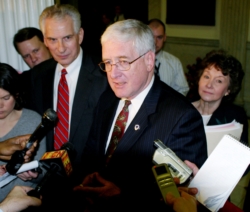Marriage amendment moves forward
BOSTON -- After repeated delays and attempts to thwart the marriage amendment, the Massachusetts Legislature voted Jan. 2 to move the amendment forward.
The amendment, which would define marriage as the union of one man and one woman in the state constitution, must receive 25 percent of a second vote in the 2007 legislative session in order to appear on the ballot in 2008. The amendment would not invalidate the more than 8,000 same-sex marriages which have already taken place.
During the 2006 legislative session, lawmakers twice voted to recess without taking up a vote on the amendment. The last time, on Nov. 9, legislators discussed the marriage issue for several hours before recessing to the final day of the legislative session, Jan. 2.
Traditional marriage supporters were outraged and two groups sought legal recourse. Gov. Mitt Romney, acting as a private citizen, along with 10 other plaintiffs filed suit on Nov. 24, asking the state’s highest court to bypass the Legislature and move the amendment forward if elected representatives failed to vote on the marriage amendment.
Then, in December, VoteOnMarriage.org, the ballot initiative committee that has organized the citizens’ petition for the amendment, filed suit in federal court against the 109 lawmakers who voted to recess. The lawsuit maintained that legislators were personally liable as individuals for their actions. According to VoteOnMarriage.org and 10 additional plaintiffs, the 109 legislators violated the U.S. Constitution and their oaths of office.
The Massachusetts Supreme Judicial Court ruled on the Romney suit Dec. 27, saying that legislators had the constitutional duty to vote up or down on the amendment. However, the court also said that, because of constitutional separation of powers, it could not force legislators to vote.
The Jan. 2 constitutional convention convened at 2 p.m. A vote on the marriage amendment followed almost immediately. The final tally was 61 to 132 in favor of the amendment, more than the 50 votes necessary for the amendment to continue forward.
Proponents and opponents of the amendment said that the SJC ruling played a significant role in bringing the amendment to a vote.
Kris Mineau, spokesman for VoteOnMarriage.org, said the ruling was the “tipping point” and clearly established that Article 48 of the state constitution requires a vote on citizen initiative petitions.
“The court ruling changed the atmosphere,” he said.
The Legislature voted to recess the constitutional convention for an hour after the vote.
After the recess, Rep. Byron Rushing, D-Boston, a vocal advocate of same-sex marriage, thanked the Legislature for the recess and time to speak with legislators in hopes of persuading them to change their votes. Rushing then called for a reconsideration vote, which nullified the previous vote.
Rep. Philip Travis, D-Rehoboth, a proponent of the amendment, spoke before the Legislature, saying that despite attempts to change lawmakers’ votes, the amendment would move forward.
“In reconsideration we will prevail,” he said.
Travis then urged the Legislature to hold the reconsideration vote immediately, without further delay to the marriage amendment.
“To run from that responsibility at this time on this day, to take up another issue to address this evening in hopes that the leadership of the House will twist enough arms to bring the number down from 61 is unconscionable, and I will not tolerate it,” he said.
Pending the reconsideration vote, the convention was recessed for a Republican caucus until 4:30 p.m.
Arline Isaacson, co-chair of the Massachusetts Gay and Lesbian Political Caucus, told reporters outside the chambers that opponents of the amendment were pushing for time to debate the issue.
When lawmakers returned from the recess, they again voted on the marriage amendment. And once again the amendment passed -- with a vote of 62 to 134.
Outside the House chamber, following the vote, traditional marriage supporters rejoiced while gay rights advocates vowed to fight on.
Mineau said he was very pleased and thankful that the Legislature voted on the amendment.
“This is a victory for the people’s right to petition,” Mineau said. “This is a victory for the constitution. The oldest living constitution in the nation has been upheld.”
Mineau acknowledged that much work lies ahead for supporters of the amendment but remained hopeful.
“We take nothing for granted here in the Statehouse,” he said. “We believe we have the momentum.”
Arline Isaacson and other same-sex marriage proponents vowed to continue to oppose the amendment.
“We’re still going to fight it,” she said.
Though she called it an “uphill battle,” Isaacson said she felt confident that the incoming Legislature would be more supportive of same-sex marriage.
Michael Festa, D-Melrose, agreed adding that the Legislature is “bending towards justice.”
The momentum is with those who support same-sex marriage, and they will continue to use the “power of persuasion” to gain more votes, he said.
According to Mineau, most of the lawmakers who voted in favor of the amendment will remain in office and are strong supporters of traditional marriage.
Edward Saunders, director of the Massachusetts Catholic Conference, the public policy arm of the Church in the state, commended the 62 legislators who voted to push the amendment forward.
“Over the past week or so some were raising doubts about whether the ruling of the Supreme Judicial Court had any effect,” he said. “We applaud those legislators that voted in favor.”



















